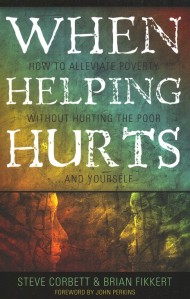Steve Corbett and Brian Fikkert, Moody, 2009, 230 pages
 Sixth Concern: Failure to Distinguish Kinds of Poverty
Sixth Concern: Failure to Distinguish Kinds of Poverty
“If you are a North American Christian, the reality of our society’s vast wealth presents you with an enormous responsibility, for throughout the Scriptures God’s people are commanded to show compassion to the poor” (13). Does it? Does the Bible talk about “the poor” in monolithic terms, or does it distinguish between the different kinds of poverty? Corbett says regarding 1 John 3:17 that no passage states the vital concern the church must have for the poor as this: “If anyone has material possessions and sees his brother in need but has no pity on him, how can the love of God be in him?”
But surely this command is not as simple as it appears. The verse just prior says that because Christ lovingly laid down his life for us, “we ought to lay down our lives for our brothers.” Should we give our life for our uncle dying of cancer, the suicidal man who is jumping off the bridge, or the Aussie who is on death row? Doesn’t it mean, rather, that should the occasion present itself, Christians must follow Christ’s ultimate example of love by being willing to lay down our lives as well? In the same way, just as there are many occasions when it would actually be sinful to lay down our lives for our brothers, it would also be sinful to give to the poor in an improper way (e.g. he refuses to work, Gal. 6:10).
Moreover, there are a number of other observations in this verse to consider. The verse speaks about “brothers”, not the world in general. The verse specifically forbids deliberately ignoring our brothers who is in legitimate need when we have the means to do so. Yes. Help this poor man. But this is a far cry from a mandate to help single moms in Uganda.
Which brings us to the matter of why this person is poor. The answer determines how we give. If he refuses to work, he shouldn’t even be given food to sustain life (2 Thess. 3:10). Scripture gives many causes of poverty, such as laziness (Prov. 10:4; 20:4, 13; 24:30-34), pride (Prov. 13:18), and an over interest in get-rich-quick schemes (Prov. 12:11). The authors give some attention to this (ch. 4) but ignore many distinctions, choosing rather to speak of poverty without distinction, which the Bible certainly does not do.
